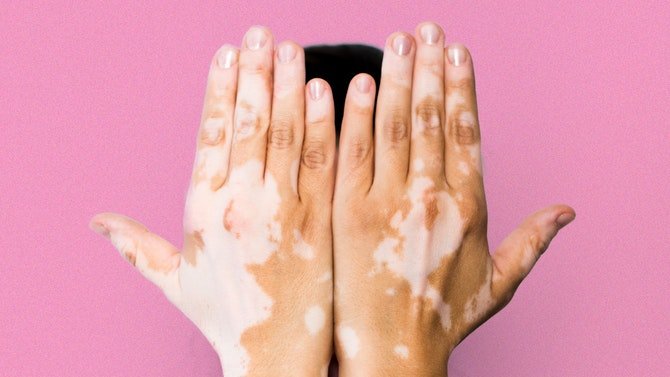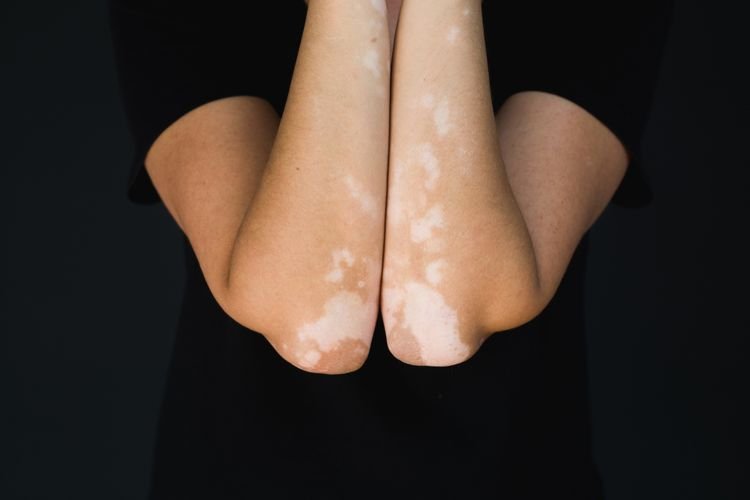Vitiligo, a chronic skin condition where patches of skin lose pigment due to the destruction of melanocytes, affects about 1% of the global population. While it’s primarily known for its visible effects, the mental health toll can be profound and often overlooked. The unpredictable spread of depigmented spots can lead to stigma, altered self-perception, and social challenges, significantly impacting emotional well-being. This blog delves into the psychological effects of vitiligo, supported by research, expert opinions, and real-life insights. We’ll explore common mental health issues, contributing factors, and strategies for support, emphasizing that while vitiligo isn’t life-threatening, its mental repercussions deserve attention and care.
The Psychological Burden: Key Mental Health Impacts


Living with vitiligo often means navigating a world fixated on appearance, where visible differences invite unwanted attention. Studies consistently show elevated rates of psychological distress among those affected.
- Depression and Anxiety: Over 65% of vitiligo patients experience varying degrees of anxiety and depression, with symptoms like persistent sadness, worry about disease progression, and fear of social judgment. A JAMA Dermatology study found patients with vitiligo are more likely to have depression and anxiety compared to controls, with odds ratios indicating a significant burden. This stems from the chronic, unpredictable nature of the condition, which can exacerbate feelings of helplessness.
- Low Self-Esteem and Body Image Issues: The aesthetic changes often lead to reduced self-confidence. A study correlated vitiligo with low self-esteem in the majority of participants, particularly those with visible lesions on the face, hands, or arms. Individuals may feel embarrassed or ashamed, avoiding mirrors or covering up extensively, which reinforces negative self-perception.
- Social Withdrawal and Isolation: Stigma plays a major role, with patients facing discrimination, stares, or misconceptions (e.g., that it’s contagious). This can result in social anxiety, withdrawal from activities, and strained relationships. Research highlights isolation, low mood, and embarrassment as common, with some experiencing bullying or verbal abuse.
- Other Effects: Vitiligo can trigger stress, which ironically may worsen the condition via autoimmune responses. In severe cases, it links to suicidal ideation or PTSD-like symptoms from trauma related to appearance changes. Factors like gender (higher impact in females), age of onset, and lesion visibility amplify these effects.
These impacts aren’t uniform; cultural contexts, support systems, and personal resilience influence severity. For instance, in societies with beauty ideals favoring uniform skin tone, the psychosocial burden intensifies.
Professional Opinions: Insights from Experts and Research
Experts underscore that vitiligo is far from “just cosmetic,” with its mental health implications rivaling those of other chronic illnesses.
- A comprehensive PMC review describes vitiligo’s psychosocial burden as driven by concealment needs and societal pressures, leading to stress, sadness, and low self-esteem. The authors advocate for integrated care addressing both skin and mind.
- In a Frontiers in Psychology article, researchers note that anxiety-depression accelerates vitiligo progression, creating a vicious cycle, and affects over 65% of patients. They recommend screening for mental health in dermatology clinics.
- Dermatology Times reports an increased risk of severe depression in vitiligo patients, urging integrated dermatological and psychological care. Similarly, an Open Dermatology Journal study found higher mental illness prevalence due to aesthetic implications.
- On X, the Vitiligo Society shares that 63% of people with vitiligo report mental health impacts, including isolation and depression, dismissing the “just cosmetic” label. Unite For Vitiligo echoes this, citing a UK survey where two-thirds struggle with mental health.
- Personal and advocacy perspectives, like those from Living Dappled, highlight community-driven mental health guides to combat stigma and support emotional well-being. Experts like those from the Association of Women in Rheumatology note vitiligo’s links to systemic diseases and mental health, beyond cosmetics.
Professionals agree: Routine mental health assessments and holistic treatments are essential, as untreated distress can worsen quality of life.
Factors Amplifying Mental Health Impacts


Several elements heighten vitiligo’s psychological effects:
- Visibility and Extent: Lesions on exposed areas increase stigma and self-consciousness.
- Cultural and Social Stigma: In some regions, myths or discrimination lead to ostracism, as noted in African contexts.
- Comorbidities: Links to autoimmune diseases like thyroid issues or rheumatoid arthritis add stress.
- Age and Gender: Younger individuals and women report higher distress due to social pressures.
- Stress Feedback Loop: Mental strain can trigger flares, as shared in personal stories.
Pathways to Support: Coping and Treatment Strategies
While vitiligo’s mental impacts are significant, support exists:
- Therapy and Counseling: Cognitive Behavioral Therapy (CBT) helps reframe negative thoughts; support groups foster connection.
- Medical Interventions: Treatments like ruxolitinib cream improve appearance, boosting confidence.
- Lifestyle Adjustments: Mindfulness, exercise, and nutrition support mental resilience; early health checks address comorbidities.
- Advocacy and Education: Organizations like V-Strong and Incyte’s programs promote awareness and mental health resources.
- Community Building: Sharing stories, as in recovery accounts, reduces isolation.
Experts recommend screening for depression in vitiligo care and holistic approaches combining dermatology with psychology.
Conclusion: Addressing the Invisible Scars
Vitiligo’s impact on mental well-being is undeniable, often manifesting as depression, anxiety, low self-esteem, and social isolation due to stigma and visible changes. However, with awareness, integrated care, and community support, individuals can mitigate these effects and thrive. If you or a loved one has vitiligo, prioritize mental health—consult professionals, join support groups, and remember: your worth transcends appearance. Resources like the Vitiligo Society or MyVitiligoTeam offer starting points. By tackling both skin and mind, we can reduce the burden and promote acceptance. Stay informed, and seek help when needed.


